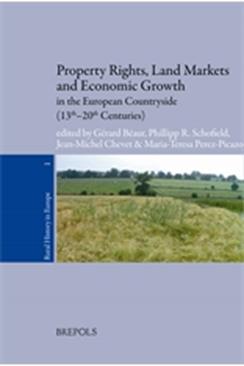Publications | Rural History in Europe
Property Rights, Land Markets and Economic Growth in the European Countryside (13th-20th Centuries)
By exploring the fundamental issues of property rights and markets in land, this book will offer important insights into long-term economic change in Europe. The essays gathered here provide a major consideration of the institutional constraints which can be employed by historians and other commentators in order to explain both the slowness or even absence of growth in certain areas of the European economy between the thirteenth and nineteenth centuries, as well as the discrete experiences of countries within Europe in this broad period.
This is an issue of current interest not least because discussion of 'institutional determinism' has become a standard of explanations of historical and economic change; that said, those promoting such approach have sometimes been criticised for generalising from an 'institutional' perspective rather than taking full account of the variety of potential causative explanations within particular historical contexts.
The present collection of essays will therefore explore the conditions which permitted the progress of agriculture in Europe and the emergence of capitalism in the countryside. The research presented in this volume helps to demonstrate that changes in the market (demand, relative prices...) encouraged changes in property rights but certainly did not do so in ways that were consistent or that led inexorably towards individual and exclusive rights of the kind described by the nineteenth-century liberal paradigm.
LIST OF CONTRIBUTORS
Annie ANTOINE, Université de Rennes 2, France
Gérard BEAUR, CNRS &EHESS, Paris, France
Bruce M. S. CAMPBELL, Queen's University Belfast, United Kingdom
Markus CERMAN, Universität Wien, Austria
Jean-Michel CHEVET, INRA, Bordeaux, France
Rosa CONGOST, Universität de Girona, Spain
Llorenç FERRER-ALÒS, Universität de Barcelona, Spain
Georg FERTIG, Martin-Lüther-Universität Halle-Wittenberg, Germany
Piotr GUZOWSKI, Uniwersytet w Bialymstoku. Bialystok, Poland
Anne-Lise HEAD-KÖNIG, Université de Genève, Suisse
Laurent HERMENT, EHESS, Paris, France
Emmanuel HUERTAS, Université de Paris I Panthéon-Sorbonne, France
Iñaki IRIARTE-GOÑI, Universidad de Zaragoza, Spain
Niels GRÜNE, Universität Bielefeld, Germany
Philippe JARNOUX, Université de Bretagne Occidentale, Brest, France
José Miguel LANA BERASAIN, Nafarroako Unibertsitate Publikoa, Iruñea-Pamplona, Spain
Luigi LORENZETTI, Laboratorio di Storia delle Alpi, Lugano, Suisse
Pablo F. LUNA, Université de Paris-Sorbonne, France
Julie MARFANY, University of Cambridge, United Kingdom
Alberto MARCOS MARTÍN, Universidad de Valladolid, Spain
Mats MORELL, Stockholms Universitet, Sweden
John Ragnar MYKING, Universitetet i Bergen, Norway
Maria-Teresa Pérez-Picazo†, Universidad de Murcia, Spain
Ricardo ROBLEDO, Universidad de Salamanca, Spain
Rui SANTOS, Universidade Nova de Lisboa, Portugal
José Vicente SERRÀO, Instituto Superior de Ciënca do Traballio e da Empresa, (ICSTE), Lisboa, Portugal
Paul SERVAIS, Université Catholique de Louvain, Belgique
Patrick SVENSSON, Lunds Universìtet, Sweden
Joseba DE LA TORRE, Universidad Pública de Navarra, Spain
 Actualités
Actualités
Les intermédiaires dans la relation de travail dans les sociétés esclavagistes et post-esclavagistes, XVe siècle à nos jours
 Appel à communication - Samedi 1 mars 2025 - 18:00ArgumentaireDans la vaste question du travail contraint et forcé, les intermédiaires, placés à l’intersection des statuts de libre, d’esclave ou d’engagé, jouent un rôle central, quoique relativement négligé par l’historiographie. Ce numéro 'Esclavages & post~esclavages / Slaveries & Post~Slaveries (n°13, 2026, CIRESC), dirigé par Alessandro Stanziani (GRHEN), propose d’exposer leurs situations dans le long terme, du moment de la traite à cel(...)
Appel à communication - Samedi 1 mars 2025 - 18:00ArgumentaireDans la vaste question du travail contraint et forcé, les intermédiaires, placés à l’intersection des statuts de libre, d’esclave ou d’engagé, jouent un rôle central, quoique relativement négligé par l’historiographie. Ce numéro 'Esclavages & post~esclavages / Slaveries & Post~Slaveries (n°13, 2026, CIRESC), dirigé par Alessandro Stanziani (GRHEN), propose d’exposer leurs situations dans le long terme, du moment de la traite à cel(...)
Hugo Souza de Cursi, lauréat de la bourse d'aide à publication de l'IDA 2024
Prix et distinctions -L’ appel à publication de thèses lancé par l’Institut des Amériques (IDA) a vocation, chaque année, à attribuer une aide financière à de jeunes docteurs en sciences humaines et sociales dans le cadre de projets de publication de leur thèse. Les thèses récompensées abordent des thématiques en lien avec les Amériques.Parmi les trois projets retenus dans le cadre de l’appel lancé par l’IDA pour l’année 2024, et soumis à l’acceptation définitive des Presses universitaires d(...)
Prix de la pensée européenne 2024
Prix et distinctions -Le premier prix de la pensée européenne, créé par des intellectuels engagés, a été remis le 16 mars 2024 à Conques, dans l’Aveyron. L’objectif est de promouvoir un idéal démocratique européen qui réponde aux enjeux environnementaux et sociaux du monde.Associé à un colloque de fond "Le réveil de la pensée européenne ?" qui sest déroulé les 16 et 17 mars au Centre européen de Conques (retransmis en direct avec Philosophie Magazine), et présidé par le philosophe Dominique(...)
ERHIMOR
EHESS-CRH
54 boulevard Raspail
75006 Paris
Tél. : +33 (0)1 49 54 24 42
ou : +33 (0)1 49 54 25 74
Fax : +33(0)1 49 54 23 99
Dernière modification :
18/04/2018



